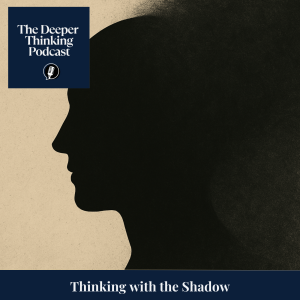
Friday Apr 18, 2025
The Shadow and the Self - The Deeper Thinking Podcast
The Shadow and the Self
The Deeper Thinking Podcast
This episode explores the shadow not as pathology, but as method—a recursive structure of return that challenges what we know about selfhood, truth, and coherence. What happens when we stop fleeing the parts of ourselves we’ve exiled? When we no longer moralise discomfort, but attend to it? The shadow is not a flaw—it is an epistemic threshold. A way of listening to what the psyche does not yet know how to say.
Drawing on thinkers like Carl Jung, Jacques Lacan, and Martha Nussbaum, the episode reframes shadow work as a philosophical commitment to remain—near contradiction, near discomfort, near what cannot be resolved. Through this lens, care becomes structure, silence becomes data, and philosophy returns to its ethical origin: presence.
As Gloria Anzaldúa reminds us, contradiction is not a threat to meaning, but its condition. And Judith Butler shows that vulnerability is not the end of thought, but its ground. The essay resists closure, avoids performance, and invites something rarer: to think as an act of fidelity, to feel as a form of recognition, to remain—not to resolve.
Why Listen?
- Philosophy as a practice of shadow integration and self-accountability
- How repression, projection, and silence shape both personal and political worlds
- Theorist-led inquiry into ethics, attention, and contradiction
- A rigorous, lyrical essay format designed for return listening
Further Reading
As an affiliate, we may earn from qualifying purchases through these links.
- The Archetypes and the Collective Unconscious by Carl Jung — A foundational account of the shadow and its role in psychic integration. Amazon link
- Giving an Account of Oneself by Judith Butler — On ethics, exposure, and the limits of self-knowledge. Amazon link
- Upheavals of Thought by Martha Nussbaum — How emotions disclose values and shape moral attention. Amazon link
Listen On:
Bibliography
- Ahmed, Sara. The Cultural Politics of Emotion. Edinburgh: Edinburgh University Press, 2004.
- Anzaldúa, Gloria. Borderlands/La Frontera: The New Mestiza. San Francisco: Aunt Lute Books, 1987.
- Arendt, Hannah. Eichmann in Jerusalem: A Report on the Banality of Evil. New York: Viking Press, 1963.
- Buber, Martin. I and Thou. Translated by Ronald Gregor Smith. New York: Charles Scribner’s Sons, 1958.
- Butler, Judith. Precarious Life: The Powers of Mourning and Violence. London: Verso, 2004.
- Cavarero, Adriana. Relating Narratives: Storytelling and Selfhood. Translated by Paul A. Kottman. London: Routledge, 2000.
- Foucault, Michel. Power/Knowledge: Selected Interviews and Other Writings, 1972–1977. Edited by Colin Gordon. New York: Pantheon Books, 1980.
- hooks, bell. All About Love: New Visions. New York: William Morrow, 2000.
- Jung, Carl Gustav. The Archetypes and the Collective Unconscious. Translated by R.F.C. Hull. Princeton: Princeton University Press, 1981.
- Kristeva, Julia. Powers of Horror: An Essay on Abjection. Translated by Leon S. Roudiez. New York: Columbia University Press, 1982.
- Lacan, Jacques. Écrits: A Selection. Translated by Alan Sheridan. New York: W. W. Norton, 1977.
- Levinas, Emmanuel. Totality and Infinity: An Essay on Exteriority. Translated by Alphonso Lingis. Pittsburgh: Duquesne University Press, 1969.
- Merleau-Ponty, Maurice. Phenomenology of Perception. Translated by Colin Smith. London: Routledge & Kegan Paul, 1962.
- Nancy, Jean-Luc. Being Singular Plural. Translated by Robert D. Richardson and Anne E. O’Byrne. Stanford: Stanford University Press, 2000.
- Nussbaum, Martha C. Upheavals of Thought: The Intelligence of Emotions. Cambridge: Cambridge University Press, 2001.
- Ricoeur, Paul. Oneself as Another. Translated by Kathleen Blamey. Chicago: University of Chicago Press, 1992.
- Weil, Simone. Waiting for God. Translated by Emma Craufurd. New York: Harper Perennial, 2009.
- West, Cornel. Prophetic Fragments: Illuminations of the Crisis in American Religion and Culture. Grand Rapids: Eerdmans, 1988.
No comments yet. Be the first to say something!